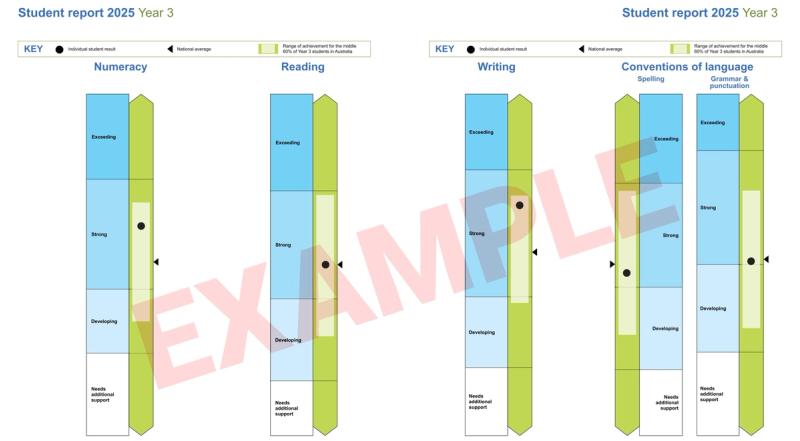How do NAPLAN Results Predict OC Test Success? The Evidence-Based Answer Every NSW Parent Needs

If you've been searching for how your child's NAPLAN results predict OC test success, you're asking a question thousands of NSW parents share.
Here’s the answer: Your child's NAPLAN results have zero bearing on their OC test selection. Not minimal impact. Not some correlation. Zero.
But before you throw away your child’s NAPLAN results paper in the rubbish, wondering what it’s actually good for, let me explain why this disconnect is actually liberating and what you should focus on instead.
Why NAPLAN Results Don't Matter for OC Selection
Let's start with what the NSW Department of Education explicitly states:
"Students must sit a placement test to be considered for Year 5 placement in an opportunity class. No other form of academic merit is considered."
Your child could have achieved "Exceeding" in every NAPLAN domain, and it wouldn't influence their OC placement one bit. Conversely, a child with average NAPLAN results isn't automatically excluded from OC success. But here's where it gets interesting - and why so many parents get confused.
The Fundamental Difference: Achievement vs. Aptitude
NAPLAN and the OC test measure completely different things:
NAPLAN Measures Achievement
- What it tests: Knowledge your child has already learned through curriculum
- Focus areas: Literacy and numeracy skills taught in school
- Question types: "What is 47 + 38?" or "Identify the main idea in this passage"
- What it reveals: How well your child has mastered Year 3 curriculum content
The OC Test Measures Aptitude
- What it tests: Your child's potential to learn and reason
- Focus areas: Critical thinking, pattern recognition, logical reasoning
- Question types: "If all Blargs are Flems, and some Flems are Grobs, can all Blargs be Grobs?"
- What it reveals: How your child thinks through novel problems
The NSW Department emphasizes that OC test questions "do not measure knowledge of the school curriculum" and that "students do not need any extra knowledge."
This is why we see seemingly paradoxical outcomes:
- Children with strong NAPLAN results who struggle with the OC test's reasoning demands
- Children with average NAPLAN scores who excel at pattern recognition and abstract thinking
Common Traps Parents Fall Into (And How to Avoid Them)
Trap 1: The NAPLAN Comfort Zone
The mistake: "My child got 'Exceeding' in NAPLAN, so they're ready for OC"
The reality: Without reasoning skill development, strong NAPLAN performers often struggle
The solution: Assess reasoning abilities separately from curriculum knowledge
Trap 2: The NAPLAN Doom Spiral
The mistake: "My child only got 'Developing' in NAPLAN, so OC is impossible"
The reality: NAPLAN doesn't measure the cognitive abilities OC tests assess
The solution: Focus on developing thinking skills regardless of NAPLAN results
Trap 3: The Preparation Panic
The mistake: Starting intensive drilling and tutoring immediately after NAPLAN results The reality: Panicked preparation creates anxiety and resistance The solution: Systematic skill building over time, not cramming
Trap 4: The Natural Ability Myth
The mistake: "Smart kids don't need preparation"
The reality: Even gifted children benefit from familiarity with question types
The solution: Balanced preparation that challenges without overwhelming
The 12-Month Gap That Changes Everything
There's another critical factor parents often overlook: timing.
NAPLAN happens in May of Year 3. The OC test occurs in May of Year 4. That's 12 months of cognitive development - an eternity in a young child's intellectual growth.
During this period, children develop:
- Abstract reasoning abilities
- More sophisticated problem-solving strategies
- Improved processing speed
- Enhanced working memory
A child who found NAPLAN challenging might experience significant cognitive leaps during this window. Conversely, a strong NAPLAN performer might not develop the specific reasoning skills the OC test demands. And keep in mind that we’re talking about a few days of NAPLAN testing, as opposed to ongoing understanding.
The Real Preparation Roadmap: What Actually Works
Now that we've established NAPLAN results shouldn't guide your preparation decisions, here's what will:
Step 1: Forget the NAPLAN Report (For OC Purposes)
File it away. It may tell you how your child understood the curriculum on a particular day, but it doesn't predict OC success.
Step 2: Make an Informed Preparation Decision
Based on these factors (not NAPLAN scores), decide whether OC preparation is right for your child:
- Reasoning appetite: Does your child enjoy puzzles, "what if" questions, and figuring out patterns?
- Problem-solving persistence: Can they stick with challenging tasks without immediate frustration?
- Reading engagement: Do they voluntarily read and discuss books, regardless of their reading level?
- Mathematical reasoning: Can they explain their thinking process, not just recall facts?
- Your child's interest: Are they curious about the opportunity?
Step 3: Implement Smart Preparation
Quality matters more than quantity. Look for materials that:
- Simulate real tests in a digital format
- Provide full explanations, not just answers
- Visually show ongoing progress
- Encourage your child to improve, and provide goals
The Bottom Line: Liberation from NAPLAN Anxiety
Your child's NAPLAN results don't determine their OC potential. Full stop. This disconnection between NAPLAN and OC isn't a flaw - it's a feature. It means you can focus on developing reasoning skills rather than drilling curriculum content.
The OC test's emphasis on aptitude over achievement levels the playing field in ways NAPLAN never could.
Try the OC Test Prep diagnostic assessment today. Discover your child's actual reasoning abilities with questions that mirror OC test demands - no credit card or minimum NAPLAN score required.
At OC Test Prep, we believe in evidence-based preparation that develops skills, rather than test anxiety. Our approach is grounded in educational psychology, namely that intelligence is malleable, not fixed.
